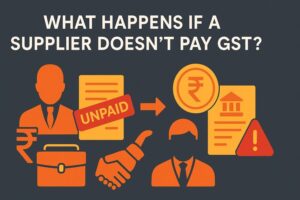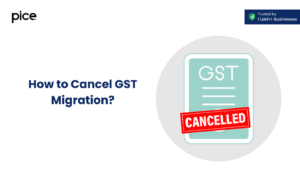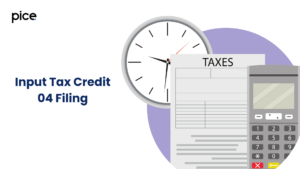Who Is Liable to Pay GST?
- 23 Jan 25
- 12 mins

Who Is Liable to Pay GST?
Key Takeaways
- Registration: Businesses must register for GST if turnover exceeds ₹40L (goods), ₹20L (services), or ₹10L (special states).
- Liable Entities: GST applies to manufacturers, traders, service providers, and import/export businesses.
- RCM: Buyers pay GST directly in specific reverse charge cases.
- ITC: Businesses offset GST on purchases against taxes on sales.
- Penalties: Late payments and errors can incur interest and fines up to ₹25,000.
GST is a form of indirect taxation that impacts the final price of commodities and services that you purchase in everyday life. However, it was introduced to simplify the tax system.
When you buy something from a GST-registered dealer, you partially pay the government as GST. Having an idea about the GST regulations can help you assess who is liable to pay GST. Therefore, we will broadly focus on the entities liable for GST and outline the duties of GST payers.
What Do You Mean by GST Liability?
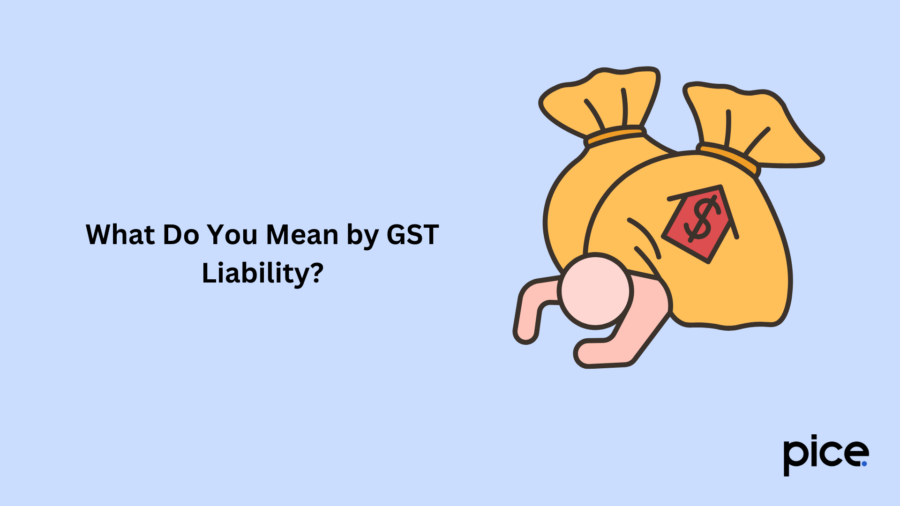
After buying something, when you pay the price for it, a part of your money goes towards the government treasury as GST. In the term ‘GST liability’, ‘liability’ is nothing but responsibility’. So, the agenda is to determine who is responsible for paying the outstanding tax.
Here’s a simplified breakdown:
- GST Registration Thresholds
Businesses operating in India must get registered under GST when their annual turnover exceeds a certain limit. You will become familiar with such thresholds when you register under GST.
- Taxable Supplies
Both the sale of goods and services attract GST. Further, if you scrutinise, then you can notice transactions that are specifically considered as taxable supplies, and this forms the very foundation of GST liability.
- Interstate Transactions
Interstate transactions are those involving the transportation of goods or services between two different states in India. These events have specific regulations for GST liability.
- Reverse Charge Mechanism (RCM)
In regular cases, the supplier of a service or product is liable to pay GST. However, under the RCM, the buyer is responsible for paying the tax directly.
- Time of Supply
When a transaction takes place, it becomes an important aspect of GST liability. It is a vital section, clarifying what events have exactly triggered the liability of the supplier.
- Tax Exemptions and Composition Scheme
There are several transactions that may be classified as tax-exempt. Certain businesses can register under GST within the composition scheme. For them, the GST implications vary and thus they contribute differently towards GST liability.
- Voluntary Registration
Businesses can choose GST registration, even if they do not have to register themselves compulsorily.
- Input Tax Credit (ITC)
The government has allowed provisions for businesses to balance their GST paid on purchases against the tax amount they gather from sales. Therefore, all traders and businessmen should implement the ITC to ensure spot-on management of tax liability.
Entities Liable for GST
In this segment, you will have a clear picture of who is liable to pay GST by law. That being said, the responsible entities include:
- Businesses
Depending on the value of transactions, enterprises and companies are often liable to pay GST amounts.
- Service Providers
Agencies, companies, or even individuals who are involved with services like professional assistance or consulting come under GST liability.
- Manufacturers
If an entity produces and sells products or is in some way engaged in the production chain supply, then such entities have to pay GST.
- Traders and Retailers
To ensure that GST is applied throughout the different stages of the distribution process, people who are related to trade or retail of goods will be liable to pay GST. This can be retail shopkeepers as well as wholesalers.
- Importers and Exporters
Businesses that are engaged in commercial activities across borders, whether that be importing or exporting, are supposed to pay due GST to the Indian Government.
- Registered Taxpayers
Entities who meet certain criteria, such as exceeding a certain income threshold, must pay the Goods and Services Tax.
- Individuals With Taxable Income
If you can secure taxable income, particularly through business activities, then you can also be liable to furnish GST to the government.
Criteria for GST Liability
A business’ yearly turnover has to fit under the following conditions so that it can opt for GST registration:
- If the company belongs to the manufacturing sector, then the threshold limit is set at ₹40 lakh per annum
- For the service industry, the threshold is ₹20 lakh or higher
- For particular categories or states, the threshold is ₹10 lakh
Special category states under GST comprise Manipur, Jammu and Kashmir, Arunachal Pradesh, Tripura, Uttarakhand, Sikkim, Nagaland, Assam, Meghalaya, and Mizoram.
- Assam and Jammu and Kashmir are two standout states that preferred having an upper threshold of ₹40 lakh for commodities.
- Whereas, in Puducherry, the GST threshold limit is set at ₹20 lakh for the intra-state supply of goods despite this place falling under a regular category state.
Exemptions and Exceptions
Some specific rules apply under the GST rule where businesses or individuals are not required to pay any tax. Here are the details:
- Small Businesses
Businesses that have an annual turnover of less than ₹20 lakh (for the service sector) or ₹40 lakh (for the manufacturing sector) can decide not to be a part of the GST regime. However, this threshold can fluctuate based on the location of the business and other factors.
- Essential Goods and Services
Various essential products like food and healthcare products, along with services related to education, transportation, etc, may be exempt from GST charges. Sometimes, they can attract low tax rates to make these offerings more affordable.
- Exported Supplies
Goods and services that have been planned for exports may be tax-exempt, or the supplier can be eligible for claiming refunds. These provisions successfully promote international trade.
- Particular Services
Specific services associated with education and healthcare can be tax exempted or treated separately under the GST law.
- Precious Metals
There can be special rules regarding taxation on selling precious metals, such as gold.
- Government Transactions
A group of transactions that link any government agency can be totally GST-exempt or carry special rules under GST.
- Agricultural Products
Certain agricultural goods and associated services may be subject to specific GST relaxations or exemptions.
Responsibilities of GST Payers
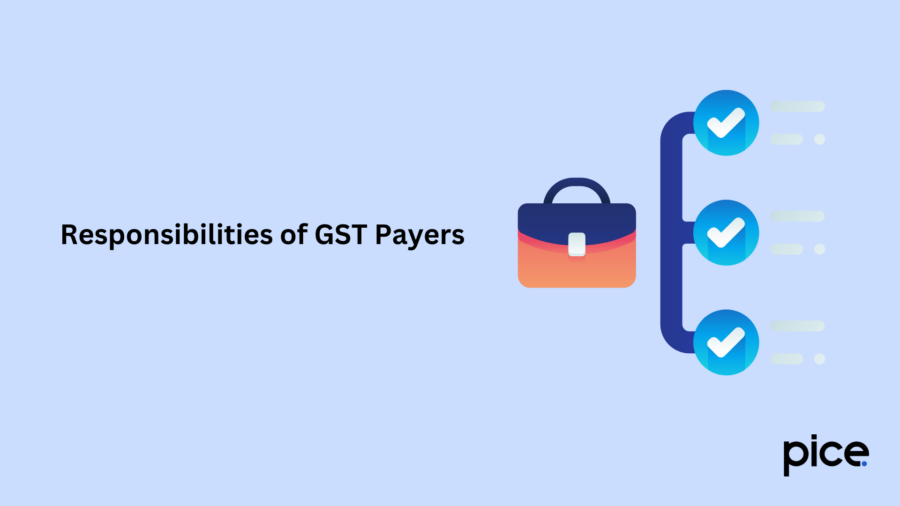
Both regular and composite GST taxpayers have to follow a set of rules that fall under their responsibilities as GST payers. Let us learn about these duties one by one:
- Registration
Business owners must register their venture or company under GST by providing all the essential details if they meet the conditions set by the government.
- GST Charge on Sales
While doing business, the GST-registered companies must charge the appropriate amount of tax from their customers. Later on, they have to remit this portion to the government on behalf of the buyers.
- File Regular Returns
Taxpayers have to submit valid tax reports to the relevant authorities on how much Goods and Services Tax they collected in reality and consequently paid to the government. For this, several reports must be filed listing down the particulars of all purchases and sales.
- Preserve Records
To ensure the accuracy of filed returns, a GST taxpayer must maintain records of all expenses, sales and purchases related to their business operations.
- Settle GST on Time
A registered business should comply with the GST rules and pay the correct amount of tax to the GST Council on time to avoid penalties and additional interest.
- Inform About Any Alterations
If there are any changes involving the business operations, taxpayers need to promptly provide the necessary details to the government. This can be a change of the business address, a switch of ownership, and so on.
- Claim Refund
When a taxpayer has overpaid GST, it is possible to claim refunds through a standardised procedure.
Impact of GST Liability on Different Sectors
The following table clarifies the impact of GST across different industries in India:
| Sector | Impact of GST Liability |
| Retailers, Distributors and Manufacturing Sector | GST boosted their competitiveness and performance. Earlier several indirect taxes increased their expenses, but with GST, those are now worries from the past. As a result, the businesses can now develop in a much better way. |
| Agriculture Sector | This sector is likely to experience significant positivity as the GST shows promise in forming the first-ever national market for agricultural products. |
| Textile Sector | Two of the most positive aspects of the GST system for the textile sector include the inclusion of the Input Tax Credit (ITC) framework and reduced transportation costs for raw materials compared to the pre-GST era. |
| Information Technology (IT) Sector | Operating expenses are significantly reduced due to the elimination of cascading effects of taxes or double taxation. Also, new business opportunities emerged as companies could focus on building enhanced software to handle GST needs for the corporate. |
| Banking Sector | Previously, bank services used to attract a 15% tax rate but now it has increased to 18%. Additionally, the transactions between banks now incur charges which happened to be free before. Finally, all the branches now need to have separate registrations. |
| Hotel and Tourism Industry | Room tariff primarily determines the GST rates for hotels. If a hotel charges less than ₹1,000 from their guests for rooms, then they do not need to pay GST. Otherwise, when the rents vary between ₹1,000-₹7,500 a 12% GST rate is imposed. Above this threshold, hotels have to charge an 18% GST from their customers. Due to a simplified tax rate than before, it has become easier for the hospitality industry to provide more clarity to their guests as well. |
| Entertainment Industry | Earlier the entertainment sector had to bear multiple taxes like state tax, central tax as well as the tax levied by local authorities. But now, the taxation policies are quite streamlined and the services either attract an 18% or 28% tax rate depending on the nature of the facilities given. |
| Automobile Sector | Automobile deals increased manifold in the GST era after several taxes like excise duty, VAT, sales tax, etc. were removed. Consequently, many automakers experienced tremendous growth between 2018 and 2019. |
| Real Estate | The GST era has brought productivity within the real estate sector and consequently, the companies have actively contributed towards the growth of the economy. Thus, the real estate sector has been one of the industries that have benefitted from the GST. |
| Education | The GST Council has attempted to keep educational institutions free from tax duties under the GST framework. Under this head, comes the facilities provided to students, education institution staff, faculty and so on. |
Penalties and Consequences

The person or entity who is liable to pay GST, if they break the rules, then a series of repercussions can follow. These are outlined below:
- If the outstanding tax payments are delayed, then an interest rate of 18% per annum is levied on the due amount. This fine is charged for the days following the due date.
- Declaring wrong information while filing GST returns can have serious consequences. Thus, a business owner must disclose the correct details about their purchases, sales, and other financial transactions to avoid penalties of up to ₹25,000.
- Penalties can also be levied on businesses that do not complete their registration when required and do not maintain appropriate financial records.
- Moreover, when a business attempts to avoid reporting the correct amount of tax, then the government can declare severe penalties for them. Consistent non-compliance acts will force the authorities to take even stricter actions.
Businesses that experience GST-related penalties lose their reputation in the market. Thus, adhering to the taxation rules is vital.
Conclusion
While exploring the GST law, you will automatically get to know who is liable to pay GST. Following the related regulations is crucial to avoid penalties and additional interest. Additionally, this helps maintain a fair and transparent tax collection system. Thus, you must comply with the laws and get help from GST experts whenever necessary.
💡If you want to streamline your payment and make GST payments, consider using the PICE App. Explore the PICE App today and take your business to new heights.
 By
By 





